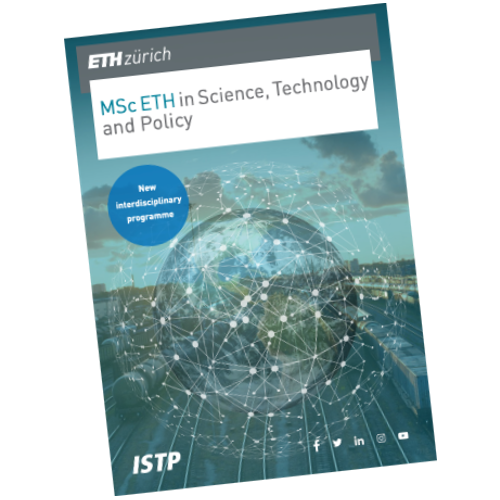Master in Science, Technology and Policy (MSc ETH STP)
Looking to deepen your natural sciences or engineering knowledge and address grand societal challenges? The STP MSc will prepare you to tackle real-world issues with scientific and policy expertise.
Application Window Now Open
Candidates with a Swiss Bachelor's degree can apply for the autumn semester of 2025 between April 1 and April 30, 2025.*
For further information please refer to the ETH Applications Page.
*All other prospective students are invited to submit applications for the autumn 2026 semester.
Why choose the Master in Science, Technology and Policy (MSc ETH STP)?
Do you hold a Bachelor's degree in natural sciences or engineering (including mathematics and architecture)? Do you want to tackle today's grand societal challenges, such as climate change, digitalisation, urbanisation, sustainable mobility or the energy transition?
With the Master in Science, Technology and Policy (MSc STP), you can deepen your current knowledge of science and engineering at the Master's level and complement this with rigorous skills in policy analysis. Policy analysis is a distinct academic field that draws on concepts, models, and methods from economics, political science, psychology, and other social sciences. Applying such skills to substantive real-world issues, whose analysis also requires science and engineering know-how, is at the core of our Master's programme in Science, Technology and Policy.

For more information about the MSc STP Programme, download the Download MSc ETH STP Brochure (PDF, 7.1 MB).
Overview MSc in Science, Technology and Policy
The Institute of Science, Technology and Policy (ISTP) currently offers a specialised interdisciplinary Master's (MSc) Programme in Science, Technology and Policy (120 ECTS).
- Vision: Complement students' technical background with skills in policy analysis and contribute to evidence-based and effective policy-making with regard to key societal challenges, such as climate change, digital society, urban development, sustainable mobility and the energy transition. Read more
- Target Group: Students who hold a BSc degree in natural sciences or engineering (including mathematics and architecture), with a strong interest in taking an active role in policy-making and policy analysis. Read more
- Duration: The MSc STP is a four-semester long Master's programme. Read more
- Language: The language of tuition is English.
- Structure: This Master's programme is structured into four types of courses that link the different disciplines and provide a broad spectrum of expertise. Read more
- Career Perspectives: The skills that are acquired in the MSc STP can be divided into three types: domain-specific knowledge, technical skills, and personal and communication skills, all of which are in high demand in the fields of research and education, industry and government, consulting, as well as international organizations. Read more